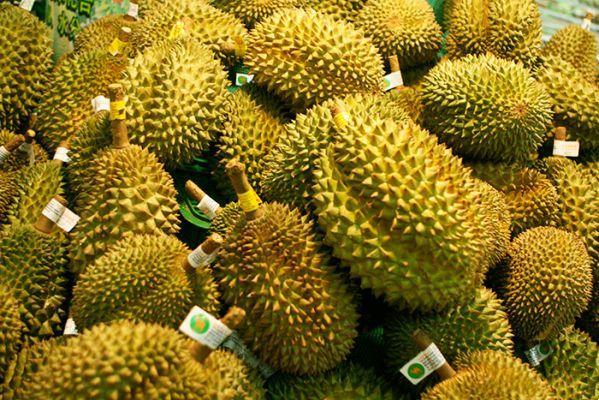
One of the first things we easily notice when browsing the web looking for information on the durian fruit, is the attempt of many to describe his unexpected qualities, or to have the experience of approaching it and tasting it for the first time, generally considered an extreme experience for the less equipped palates, and around which stories or real urban legends have been born and continue to be born.
It is certainly a fruit that makes people talk a lot, especially with the development of the internet that allows us to sift through the culinary habits of distant countries and, if desired, to find a way to buy the fruit without necessarily having to travel to Asia.
Two things are certain: it is an expensive fruit (but there are others much more expensive) and it is, as we will have the opportunity to deepen a bit, a real one superfoods ed one of the most complete foods among fruits.
The pros of durian: more than a fruit
In countries like Malaysia and Thailand il durian is truly the king of fruits: there are real places dedicated exclusively to the sale and consumption of durian, with the characteristic of being open on all four sides to prevent odorous fumes of the fruit to accumulate indoors. Because what is said about it is true and often not even exaggerated: durian has a very strong smell and anything but attractive.
Yet not only the locals love the fruit, many people come from abroad and others have the fruit shipped: durian has a texture similar to that of a very tender and buttery meat, it is rather dry and therefore easily satiated. No other food is known that can explode into so many different, contrasting and persistent flavors, so much so that continuous aftertaste remains imprinted in the mouth even for hours after eating it.
Inside you can taste in a single bite the sweetness of mango, the complexity of a coffee cream, the smell of onion, the hints of honey, explosions of chocolate, spicy hints of jasmine or perilla, the body of the egg firm and aged cheese, the energy of cognac and a neutral base of pumpkin or almond paste. How else would that be possible?
The cons of durian: an experience that is too intense
However, durian's detractors are not lacking. Not all palates are ready for a hurricane of flavors, to a caledoscope of sometimes antithetical aftertaste, which is often poured out too intensely.
La pasty persistence of flavors it is experienced by many more as a defect than as a positive characteristic. Probably the real difficulty, the biggest stumbling block is being able to bring such a smelly bite to your mouth, because it's true: durian smells unquestionably bad and difficult to describe.
The gases that come out of the fruit, even before it is opened, they recall rot and resemble the smell of sewer, carcass, rotten onions. This is why they exist numerous prohibitions related to durian: it cannot be brought into closed rooms, hotel rooms, or transported by plane, and many states prohibit its cultivation.
Some people find that the experience of eating durian is too exaggerated and not as intense as described; often this is due to the fact that they have tasted frozen pulp, which therefore has lost a lot in terms of smell and taste: open durian quickly diminishes its potential.
Jambul is also among the fruits considered superfood
Properties of durian
Curiosity aside, durian is worth eating: generally every type of fruit abounds in a particular vitamin or substance but hardly has a large content of a broad spectrum of vitamins, a fruit rich in anthocyanins is unlikely to be rich in carotenoids as well.
In this, durian is a wonderful exception: it is in the first places for vitamin C but it is also first for flavonoid content and anthocyanins, while it is also very high in the ranking fruits richer in carotenoids, without considering the good content of B vitamins.
How to find durian
But how is it possible to find it in the country? We can buy packs of frozen pulp or dehydrated chips in ethnic food stores, but to enjoy it fresh without traveling to the other side of the world there are two ways: contact a online exotic fruit retailer, or try to agree with the owner of a ethnic food shop, which are often available to find it but only on order, since exhibiting a durian in the store would mean driving away all the customers in one fell swoop!
Durian recipes
Given all the properties of durian, the ideal would be to hold your nose and consume it fresh, natural, as is done in most cases, however it is not a mortal sin to use durian and the immense taste resource that it also represents in different recipes. Let's see some of them.
In Malaysia there is what seems more like a trick than a recipe, to remedy the smell of the fruit: mix the pulp with coconut milk, yogurt and a teaspoon of curry, creating a mix called tempoyak.
In Asia, i durian ice cream and mint with chocolate flakes: mint gives balance to durian by covering its smell making the goodness of durian available for all palates. Impossible not to mention the fried durian chips, much less aggressive in taste and easy to eat.
With a piadina it is possible to adapt an Indochinese dish, the roast in durian, to our local cuisine: durian pulp and spreadable chocolate to fill a hot piadina and that's it.
In Thai cuisine there is one durian, persimmon and cinnamon cream passed to the mixer which, it seems, is excellent for seasoning sweet and sour salads.
Like durian, jackfruit is also considered a superfood
| "Durio kutej F 070203 ime" by W.A. Djatmiko (Wie146)


























